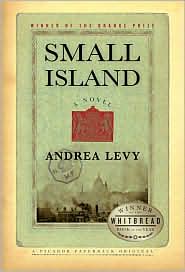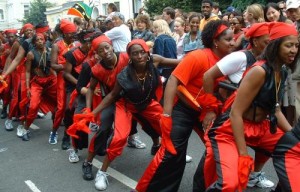Note: This novel was WINNER of the Orange Prize in 2005.
“It was inconceivable that we Jamaicans, we West Indians, we members of the British Empire would not fly to the Mother Country’s defence when there was threat. But, tell me, if Jamaica was in trouble, is there any major, any general, any sergeant who would have been able to find that dear island?”
Winner of the U K’s Whitbread Prize for Best Novel, the Orange Prize, and the Commonwealth Writers’ Prize, Andrea Levy’s Small Island has just been released in the US, where it may win as many readers as it has “across the pond.” Set in London in 1948, it focuses on the diaspora of Jamaican immigrants, who, escaping economic hardship on their own “small island,” move to England, the Mother Country, for which the men have fought during World War II. Their reception is not the warm embrace that they have hoped for, nor are the opportunities for success as plentiful as they have dreamed.
K’s Whitbread Prize for Best Novel, the Orange Prize, and the Commonwealth Writers’ Prize, Andrea Levy’s Small Island has just been released in the US, where it may win as many readers as it has “across the pond.” Set in London in 1948, it focuses on the diaspora of Jamaican immigrants, who, escaping economic hardship on their own “small island,” move to England, the Mother Country, for which the men have fought during World War II. Their reception is not the warm embrace that they have hoped for, nor are the opportunities for success as plentiful as they have dreamed.
Alternating among four points of view, Levy involves the reader in their interconnected stories, which she tells with an honesty and vibrancy that make the tragicomedy of their lives both realistic and emotionally involving. Queenie Bligh, a white woman with a mentally ill father-in-law, takes in boarders to make ends meet when her husband Bernard does not return from India. Most of her boarders are black immigrants from the Caribbean, desperate men and women who are willing to pay high prices for small rooms, and Queenie gradually befriends them on a personal level. Gilbert Joseph, a Jamaican who participated in the Battle of Britain, is one of Queenie’s tenants, giving up his dream of studying law and working instead as a truck driver, the only job available to him. Six months later, his “golden-skinned” bride Hortense arrives at Gilbert’s small room with her heavy trunk, ready to show London her superior “British” manners and hoping to work as a teacher. When, Queenie’s husband Bernard unexpectedly moves back home, life at Nevern Street changes forever.

These four major characters, through their often touching first-person stories, convey their hopes and dreams for the future, revealing, as their stories intersect, their personalities, family backgrounds, experiences in love, commitments to the Mother Country, their economic predicaments, and, not incidentally, their prejudices. Queenie, as a woman trying to support herself and her dependent father-in-law, reveals the predicament of many other British women in the post-war years, her pluck, resourcefulness, and practicality matched only by her generosity. Gilbert, equally sympathetic as a character, is imbued with the pride of a soldier who has answered the call of his country, but he is disillusioned when he discovers that he is an unwanted outsider in London and that most of the population thinks Jamaica is a country in Africa.
Hortense is a snob about her golden skin (the result of her mother’s relationship with a white man). Her Jamaican teaching certificate, she discovers, is useless in London, and she is helpless–and bitterly contentious–during the couple’s transition to London life. Bernard’s story of his war-time experiences in India betrays both his resentment against his superior officers and against the Indians he has met, and he returns home with an even greater conviction of his own superiority and a resentment he applies to Queenie’s tenants.

The Notting Hill Festival, an annual Caribbean Festival in London
The daughter of immigrants who came from Jamaica to England in 1948, author Andrea Levy imbues this novel with fine detail, both in her descriptions of the physical surroundings and in the emotional subtleties with which her characters react to their postwar lives. Her ear for dialogue is exquisite, both in the everyday speech of Londoners and in the dialect and sentence patterns of Jamaicans. The casual, conversational tones of the various characters as they tell their stories bring them to life, while Gilbert’s recognition of “the way things are” keeps the novel from becoming polemical or strident, despite the obvious thematic emphasis on prejudice and injustice. Levy maintains a light and often humorous touch, creating scenes of amusing irony and high drama with equal effectiveness.
The author’s tendency to tie her male characters to real, historical events–the Hindu/Muslim riots in Calcutta (experienced by Bernard), and a race-based riot in a London movie theater (experienced by Gilbert)—and her reliance on extreme coincidence to conclude the action do occasionally feel intrusive and manipulative, but this is a minor quibble. This is a hugely conceived novel has everything going for it—well-drawn characters, wonderful descriptions of an unusual time in postwar London, important themes which are not beaten to death, and lively action and interactions which keep the reader constantly involved. (On my Favorites List for 2005)
Notes: Also reviewed here: Levy’s THE LONG SONG
The author’s photo appears on http://www.bbc.co.uk
The Notting Hill area of London is still the home of a large Caribbean population. The photo here is of the Notting Hill Carnival, held in August each year: http://commons.wikimedia.org
The trailer for the PBS television series for this novel is here:
